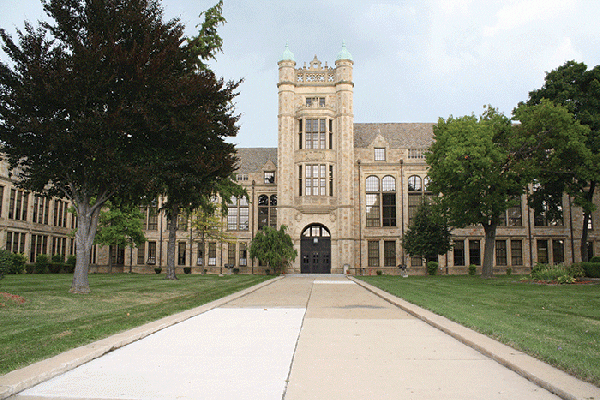
DEARBORN — The Dearborn School District reflects the increasing demand for products prepared in accordance with Muslim religious guidelines.
Halal meat and poultry options were first introduced to one Dearborn public school in 2001. In recent years, more schools in the district have followed suit. Twenty-two of the 32 Dearborn schools now serve halal alternatives.
Jeff Murphy, food service coordinator for Dearborn Public Schools, said halal offerings expanded more in the past five years, based on requests from principals or parent-teacher associations.
As a result, student participation in the National School Lunch Program grew, according to Murphy.
He said the increased participation offsets the higher cost of halal products, which are usually 15 to 20 percent more expensive.
“It’s probably 4 to 6 percent higher, which, in a district our size, is considerable,” Murphy said of the greater participation.
The district of more than 19,000 students serves approximately 11,000 meals per day. In 2001, that number was about 7,500. At Lowrey School, the average meals served increased after the introduction of halal options from 587 in 2001 to 898 last school year.
Schools receive cash reimbursements for each meal they serve that complies with federal standards. That participation growth translates to increased revenue for the district’s food service department. Lunch sales cover salaries and other expenses for the self-operating branch.
Stephanie Willingham, consultant manager with the Michigan Department of Education in the School Nutrition Programs Unit, said serving halal options does not affect schools’ abilities to comply with state or federal nutrition standards.
“We’ve always trained that it’s best practice and good customer service to offer the foods that the students will eat and that the families are asking for; that the community is asking for,” Willingham said.
More schools across the nation are asking for halal options and looking to Dearborn as a model.
Murphy said the food service director for New York City’s public schools asked for his perspective on offering halal products in school cafeterias. He also participated in a San Diego Unified School District conference call with parents before that district’s recent introduction of halal options.
Murphy said school districts should accommodate students’ food preferences.
“My job is to feed as many kids as I can and that’s what I do,” said Murphy, who is in his 15th year in the food service department.
However, there are some limitations on the department’s efforts to be inclusive.
The USDA gives the district an entitlement to purchase goods, along with guidelines for their expenditure.
Murphy said most districts can put the money toward “center of the plate items” — chicken patties, chicken nuggets and hamburgers — but his department cannot. Dearborn Schools are unable take advantage of discounts from companies such as Tyson that offer schools a discount on poultry products, because they do not follow the halal slaughtering method.
Nevertheless, halal options at some district schools have moved beyond hot dogs, chicken nuggets and chicken patties. Murphy said more halal products are now available at a lower cost. Halal lunch meats, ground beef and turkey are among the new options.
With chicken nuggets and some other foods, the district offers only halal instead of a halal and non-halal option to avoid confusion, Murphy said.
And according to Murphy, the halal poultry is a better product.
Warda Kalim, staff attorney and safe spaces coordinator for the Council on American-Islamic Relations in Michigan (CAIR-MI), who has worked with Crestwood and Melvindale schools to incorporate halal products, said it is viable for schools to have halal offerings when the student body is majority Muslim.
“Even in districts where there aren’t a lot of Muslims, they still offer them because it’s something that non-Muslims can also eat if they eat meat,” Kalim said. “It’s not something that’s just strictly for Muslims.”
Ron Batshon, senior vice president of World Pure Foods, one of the Dearborn Public Schools halal suppliers, has worked with the district for several years. Batshon operates the 35-year-old business that his father started. According to Batshon, the market for halal is dramatically different today than it was in his father’s time.
“I don’t think it’s ever going to be the kosher,” he said, referring to the Jewish version of halal, “but it’s becoming more and more prevalent throughout the state, really.”
According to a report commissioned by the Dubai Chamber of Commerce, the global halal market is growing rapidly and predicted to be worth $1.6 trillion by 2018, up from $1.1 trillion in 2013.






Leave a Reply